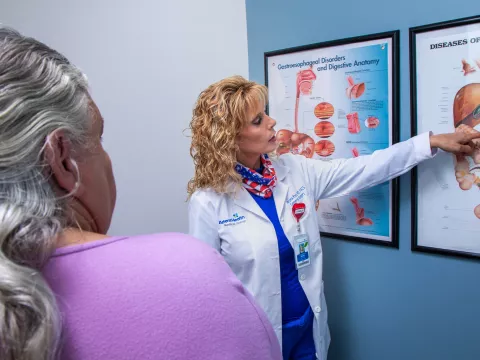- AdventHealth

With more 17 people killed and others injured in the recent Parkland school shooting, countless personal stories are beginning to emerge of people who witnessed or experienced the attack.
Some local residents may be wondering how they can best offer support and words of hope to grieving friends or family members. In some cases, simply reaching out to let them know you are thinking about them can make a big difference in their healing.
AdventHealth Center for Behavior Health's Catherine Nesov, LMHC, offered these tips for helping loved ones who have been personally impacted by the attack.
Q: What are some tips for communicating to loved ones about violent attacks or tragedies?
A: It's similar to how you would respond to a family member who is grieving.
Be available. When people experience hardship, many don't want to reach out. They don't want to be a burden, and they might not reach out to you. It's imperative that you reach out to them. If they don't call you back on Monday, try again on Wednesday. Just keep trying. Be consistent with your support.
Also, consider the person and respond accordingly. Some people don't like to talk on the phone or be vulnerable in person. Think about how they like to communicate. It's important for that person to know they have someone thinking of them.
One of the questions I like to ask is "How are you not doing well?" instead of "how are you doing?"
"How are you doing?" doesn't lead to open and honest responses. "How are you not doing well?" really tells the person, "I'm ready to hear your hardship and take on the experiences you're having and be there for you."
If for any reason you are worried about a family member harming themselves or others, don't hesitate to call authorities. The majority of the time authorities respond appropriately and help support the person to get them the help they need.
If you can physically be there for the person, try to do that. Get them out of the house, do things together, take a trip to see them.
Q: Any tips on how to offer support to loved ones at a distance?
A: There are a lot of creative ways. You can send quotes via text or email. Knowing if the person is spiritual or religious can be important; find meaningful stories or scriptures to bring hopefulness.
Send reminders that people are good and the world is good. Show examples of positivity.
Q: How can you help communicate to a friend/family member that you are concerned about them and that they might need help?
A: Remind them that everyone needs support and help. There is no stigma in getting the support. Bring things back to the basics. When you are well you are the best version of yourself, and if you need help to get that person back, it's OK.
Find stories they can relate to: for example, if a businesswoman and mother are having a hard time coping with this tragedy, find a relatable story of someone who needed help and got it to help her feel validated, not strange or weak.
You can also talk about your own experiences. Share some success stories. Help to develop confidence in that decision to get that support.
Offer to go with them if you can, or suggest they find a support person to go with them to their appointments. It feels good to have someone in your corner.
For more information about behavioral health services, please call Call855-303-DOCS.



